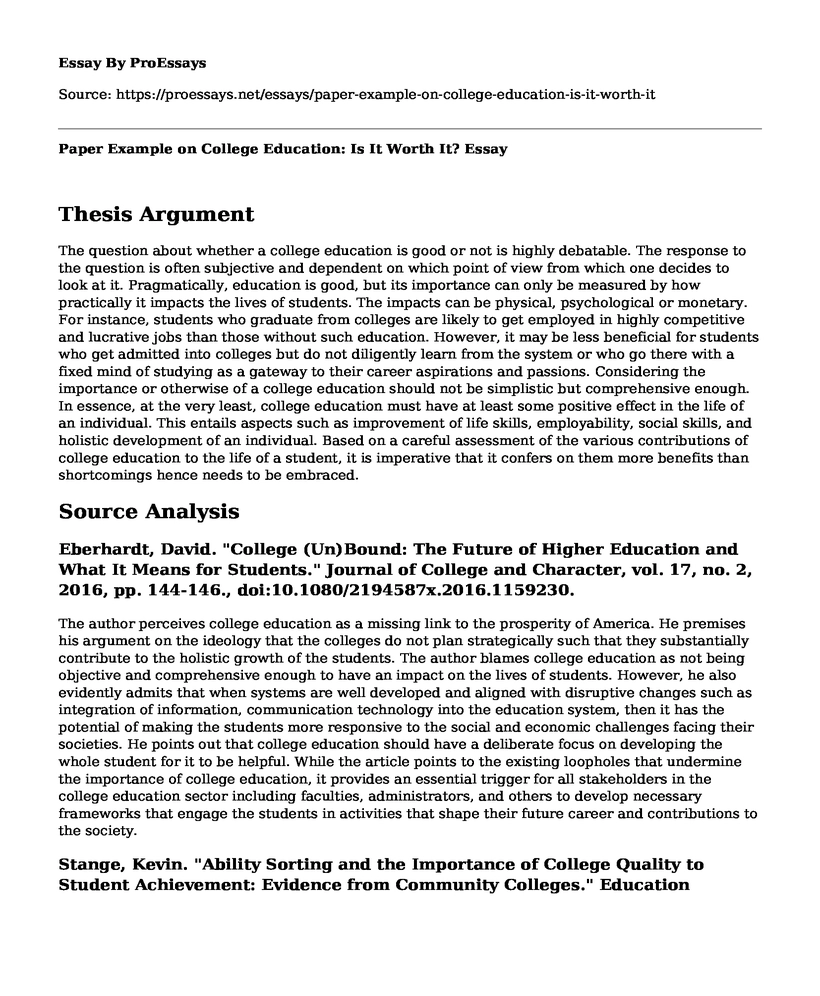Thesis Argument
The question about whether a college education is good or not is highly debatable. The response to the question is often subjective and dependent on which point of view from which one decides to look at it. Pragmatically, education is good, but its importance can only be measured by how practically it impacts the lives of students. The impacts can be physical, psychological or monetary. For instance, students who graduate from colleges are likely to get employed in highly competitive and lucrative jobs than those without such education. However, it may be less beneficial for students who get admitted into colleges but do not diligently learn from the system or who go there with a fixed mind of studying as a gateway to their career aspirations and passions. Considering the importance or otherwise of a college education should not be simplistic but comprehensive enough. In essence, at the very least, college education must have at least some positive effect in the life of an individual. This entails aspects such as improvement of life skills, employability, social skills, and holistic development of an individual. Based on a careful assessment of the various contributions of college education to the life of a student, it is imperative that it confers on them more benefits than shortcomings hence needs to be embraced.
Source Analysis
Eberhardt, David. "College (Un)Bound: The Future of Higher Education and What It Means for Students." Journal of College and Character, vol. 17, no. 2, 2016, pp. 144-146., doi:10.1080/2194587x.2016.1159230.
The author perceives college education as a missing link to the prosperity of America. He premises his argument on the ideology that the colleges do not plan strategically such that they substantially contribute to the holistic growth of the students. The author blames college education as not being objective and comprehensive enough to have an impact on the lives of students. However, he also evidently admits that when systems are well developed and aligned with disruptive changes such as integration of information, communication technology into the education system, then it has the potential of making the students more responsive to the social and economic challenges facing their societies. He points out that college education should have a deliberate focus on developing the whole student for it to be helpful. While the article points to the existing loopholes that undermine the importance of college education, it provides an essential trigger for all stakeholders in the college education sector including faculties, administrators, and others to develop necessary frameworks that engage the students in activities that shape their future career and contributions to the society.
Stange, Kevin. "Ability Sorting and the Importance of College Quality to Student Achievement: Evidence from Community Colleges." Education Finance and Policy, vol. 7, no. 1, 2012, doi:10.1162/edfp_a_00054.
The author looks at the imperatives of institutional quality of student academic outcomes from colleges. From the standpoint of the author, the mindset and aptitude of the student have a critical role in determining how college education impacts their lives. For instance, he poses that while high achieving students are likely to have a positive attitude towards a college education, some low achieving students do not. Therefore, improving the quality of college education alone is not a significant way of assuring better student results. The author thus admits that the college education can be beneficial in the lives of students if the stakeholders employ a useful matrix that integrates student attitude, quality of instruction and others to guarantee better outcomes. In his conclusion, the author emphasizes that the quality of community college (measured by instructional expenditure per student and several other measures) does not have a significant impact on community college students' educational attainment. Therefore, it remains the role of every college administration to identify the most influential factors in student attainment that can make such institutions achieve their functions in the lives of their graduates.
Cite this page
Paper Example on College Education: Is It Worth It?. (2022, Dec 29). Retrieved from https://proessays.net/essays/paper-example-on-college-education-is-it-worth-it
If you are the original author of this essay and no longer wish to have it published on the ProEssays website, please click below to request its removal:
- Paper Example on Child Development
- Children's Online Privacy Protection Essay Example
- Social Media and Social Development Paper Example
- US Terrorism and Homeland Security: I Am Malala
- Essay Sample on Effect of ADHD on Child, Parents, and Siblings
- Essay Sample on Good Leaders: A Uniquely Composed Picture
- Free Report Sample on Maximizing Corporate Wellness: Benefits of Health Programs in Modern Workplaces







